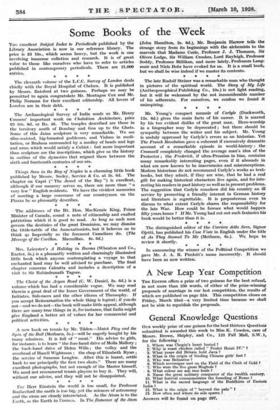Mr. Young's compact memoir of Carlyle (Duckworth, 12s. 13d.) gives
the main facts of his career. It is marred by his too evident dislike of the great man. Hero-worship in a biographer may be deprecated ; but there should be sympathy between the writer and his subject. Mr. Young is unduly oppressed by Carlyle's errors as an historian, Yet The French Revolution gave a coherent if excessively dramatic account of a remarkable episode in world-history.: the Cromwell completely changed the average man's idea of the Protector ; the Frederick, if ultra-Prussian in bias, contains many remarkably interesting pages, even if it abounds in what are now known to be inaccuracies and misconceptions. Modern historians do not recommend Carlyle's works as text- books, but they admit, if they are wise, that he had a real gift for making historical characters live again, and for inte- resting his readers in past history as well as in present problems. The suggestion that Carlyle somehow did his country an ill service by promoting a friendly interest in German history and literature is regrettable. It is preposterous even to discuss to what extent Carlyle shares the responsibility for the late War. How could he foresee what would happen fifty years hence ? If Mr. Young had cut out such fantasies his book would be better than it is.


























































 Previous page
Previous page